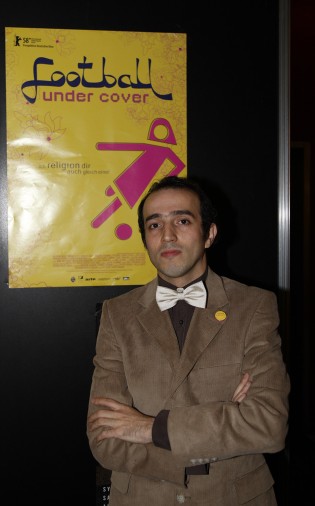
Football Under Cover by David Assmann, Ayat Najafi
DEU 2007, Perspektive Deutsches Kino

Football Under Cover by David Assmann, Ayat Najafi
DEU 2007, Perspektive Deutsches Kino
proceedings, because today, men are barred from the game.
Although their only desire was to play football together, it has taken the young women of both teams a whole year of bitter struggle to get where they are today. Theirs has been a battle against testosterone, arbitrariness and oppression. This film accompanies Marlene, left-back of the Kreuzberg club BSV AL-Dersimpor, and Iranian player Niloofar on their journey. Niloofar, who, as she says, does whatever she wants, dreams of Beckham and helps Marlene plan the big event. In Germany preparations are also under way and the girls set about learning about Iranian codes of behaviour. They don’t just want to play a game; they want to get to know each other and find out what it’s like to wear a headscarf on the pitch says Susu, who, like many of the girls in the team, is Muslim herself. An eight-hour plane trip away, Narmila and her mother kick a ball about on the street, their chadors and headscarves fluttering in the breeze. Although it’s impractical, they manage.
In spite of the game being postponed time and again, and the fact that the women are not able to play in Asia’s largest football stadium as planned, but on a dried up old pitch; and although Niloofar is forbidden from taking part in the game – for reasons which nobody understands – the girls refuse to be browbeaten. And, when the big day arrives, there’s singing and dancing on the grandstands. This 90-minute film is more than just a football game. The desire for self-determination and equality is being expressed here and, one thing is clear – change is possible.
Additional information

Ayat Najafi
Ayat Najafi, one of the filmmakers of the documentary Football Under Cover.
Football Under Cover · Perspektive Deutsches Kino · Feb 10, 2008

Football team
Part of the Berlin Kreuzberg football team from Football Under Cover.
Football Under Cover · Perspektive Deutsches Kino · Feb 10, 2008

Football Under Cover
The filmmakers Ayat Najafi and David Assmann (here with part the women’s football team from Berlin Kreuzberg) were awarded the TEDDY for the Best documentary as well as the Volkswagen Audience Award for Football Under Cover.
Football Under Cover · Perspektive Deutsches Kino · Teddy Award · Feb 14, 2008
